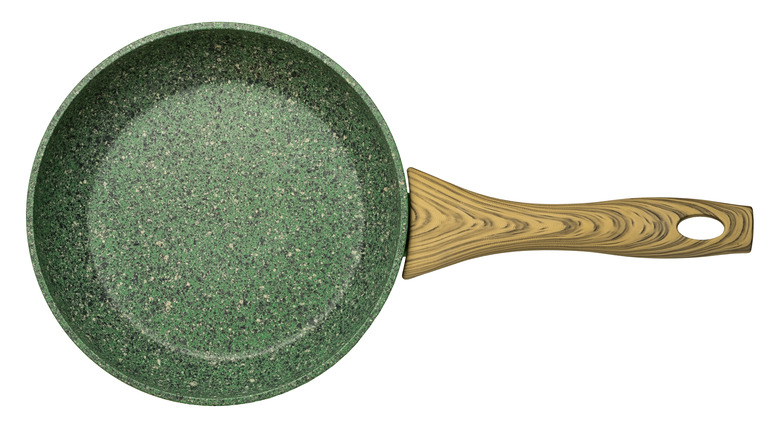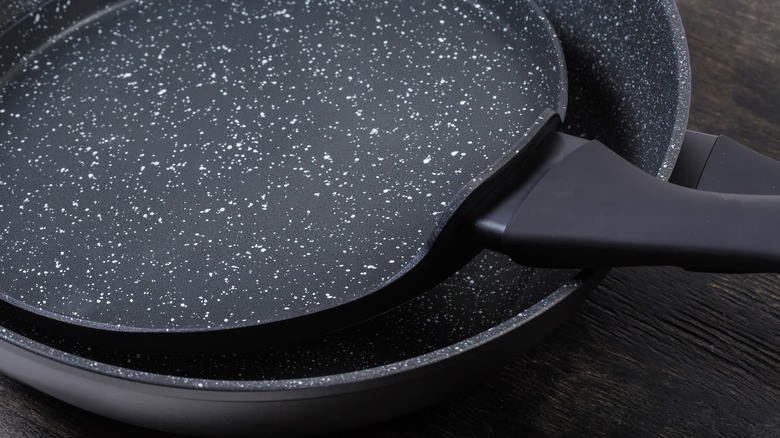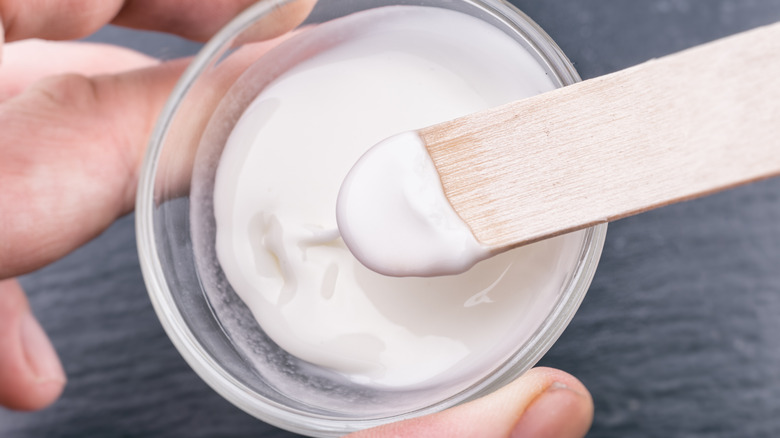The Best Cleaning Tips For Your Stone Cookware
First used more than a thousand years ago in China, per Markets At Shrewsbury, different types of stone-derived cookware have now achieved trendy status in today's modern kitchens. Well-suited for cooking or serving food or as decorative pots or planters, stoneware is replacing more conventional cookware. One primary reason for stone cookware's popularity is that it is easy to clean — provided the user follows the guidelines. Its surface is smooth and virtually nonporous, and food does not readily stick to it. Properly and diligently cleaned, maintained, and stored, authentic stoneware can last several generations.
Stone cookware is derived from clay fired at extremely high temperatures (at least 2,200 degrees Fahrenheit and, at most, 2,800 degrees Fahrenheit ), making it resemble stone. It should be cleaned inside and out after every use, and it benefits from a deeper cleaning once a week, depending on the frequency of use. Only appropriate cleaning implements should be employed, and don't immerse stoneware for undue exposure while cleaning. Stone cookware should be hand-washed, and dishwashers should be avoided, despite some manufacturers' claims to the contrary, to protect the piece and prolong its seasoning. Some natural cleaners are safe and effective for use on stoneware. According to World Of Pans, always obey Rule No. 1: Do not clean stone cookware with soap, which will degrade its surface. Always read the item's instructions before cleaning if it has special requirements.
Clean stone cookware regularly
Cleaning stone cookware after each use is imperative to prevent residue buildup; discoloration will otherwise take hold over time. Proactively pay attention while cooking, so food does not burn onto the cookware to save time and cleaning effort later. After use, stoneware should be allowed to return to room temperature before starting the cleaning process. First, wipe off surface dirt, oil, or food particles with a paper or cloth towel. Never use steel wool or a hard pad or risk scratching the stoneware. Gently push food debris into a corner to aid cleaning, then rinse and repeat if necessary. Use warm water to clean; remember, don't soak the stoneware. Excessive immersion in water can cause it to weaken and become brittle eventually, warns Cookery Space. After rinsing, inspect for any residual food particles and air dry the cookware once it feels clean and smooth.
Avoid using strong chemicals or powerful cleaners. Although stoneware is nonporous for all practical purposes, Maids By Trade recommends not using anything that might impart a lingering aroma to the piece or taste of your food. Don't use traditional utensils when scraping. A nylon scraper with rounded edges is the best implement, and one is frequently sold along with the stoneware piece. Otherwise, purchasing one separately is suggested. Nylon spatulas, nylon scrubbing pads, or soft sponges are other recommended tools to avoid damaging the cookware.
Stain removal and deeper cleaning
For deeper weekly cleaning, a paste concocted using a half cup of baking soda and 3 tablespoons of water works well. Taste Insight recommends letting it sit on the cookware's surface for 15 to 20 minutes and gently scraping, then rinsing. Air dry thoroughly to thwart bacteria growth. For stain removal, Pure Aid Hub suggests the following: Cover the item's stains with hot water, adding up to 5 drops of dish detergent. Boil for approximately 15 minutes, let it cool, rinse, and wipe. If the stain persists, boost the process with a handful of table salt in a glass of warm water. Pour in and let the mixture stew for 20 minutes. Then add dish detergent and gently scrub.
A combo of white vinegar and baking soda can also be used judiciously to deal with stains and discoloration, or a dab of the sodium bicarbonate can be applied directly and then sponged off. The vinegar-baking soda application also will serve as a deodorizer. Once cleaned, store all stone cookware items in a cool, dry area until subsequent use. Although citrus and stone cookware do not necessarily mix, using a bit of lemon juice on a damp cloth can work as a degreaser and odor remover. However, use the liquid cautiously as it may dull the glossy exterior, per Design Farm House.


